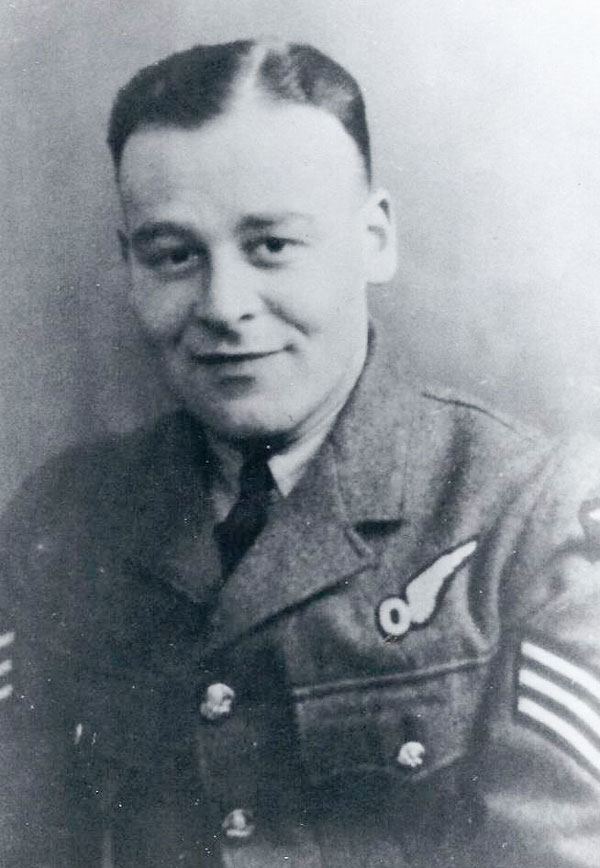This biography was authored by Rusty Russell and has been extracted from Mast High Over Rotterdam – Please respect Rusty’s Copyright to the work as detailed in the first section of the book.

Born in Ealing on 31st March 1916, George Dvorjetz took employment as a cinema manager after leaving school. He was also a member of the Civil Air Guard, completing 11 hours of dual and 9 hours of solo flying by the time he enlisted in the RAF in October 1939. Like many others, and despite his recent pilot experience, George was no doubt conned into training as an observer, with the promise of remustering later, when there were more vacancies for pilots…
George’s reward for an early enlistment at the Reception Centre at Uxbridge was a request to come back in three months time. Similar periods spent at No 4 ITW Bexhill, and an air observer school, were followed by a posting to No 4 B&GS on 13th July 1940. After completion of the course, George was posted to No 17 OTU Upwood in September 1940.
George Dvorjetz was not Wing Commander Tim Partridge’s original observer from 17 OTU: he replaced Plt Off Bull who was posted elsewhere. George’s original pilot, Plt Off Ogilvie, had been shot down into the sea by a Messerschmitt Bf 109. Mary Partridge had asked Tim how he felt about losing his old observer and picking up a ‘new boy’. Tim had reassured her with his reply: ‘Dvorjetz is a very good chap, and very experienced.’
Indeed he was. George had been operational on Blenheims since joining 82 Squadron at Bodney in December 1940. In 2 Group terms he was a veteran. Posted to 21 Squadron at nearby Watton in April 1941, he did not team up with Tim Partridge until the end of May. He then stayed with Tim until the crew were killed in action on 16th July 1941.
Eye-witnesses had reported seeing Partridge’s aircraft, over Rotterdam with the port engine on fire, trying to land in a park with a large playground. When it was realised that the park was full of children and many adults, the aircraft was pulled up over the rooftops before the Noordsingel canal presented itself. Regrettably, the aircraft’s wingtip hit the Courthouse and it plunged into the bank of the canal. Tom ‘Jeff’ Jefferson has a poignant story to tell:
‘Dvorjetz was Polish or of Polish extraction. A very nice chap; he was fairly short and thick-set, with a bit of a moustache. Because he’d already done a tour he was made Station Navigation Officer. This meant that he could fly occasionally with the CO, Tim Partridge, but had to spend most of his time running the station. And on 16th July 1941 he was having a day off, and he’d gone over to that lake in the grounds of Blickling Hall, taking his fishing rods, intent on having a quiet day’s fishing. He was called back and told to report for briefing, to fly with the CO on the Rotterdam raid. Poor chap! It was dreadful seeing him struggling in the aircraft – that stuck in my mind for a long time.’
George’s remains lie in the Crooswijk Cemetery, Rotterdam, along with those of his crew. He was survived by a brother, Samuel, and a sister, Nora.
Immediately after the Germans departed Rotterdam, the Dutch erected a temporary wooden memorial at the exact spot on the Noordsingel where they crashed. This was later superseded by the permanent stone memorial, whose inscription reads: ‘In grateful memory of the men of the RAF who gave their lives for the freedom of the Netherlands’.

A distant cousin of mine Sgt J M Irving (KIA 10-4-1941) was Sgt Dvorjetz pilot on his first tour with 82 Squadron 16 missions. I have a photo of him. I would be keen to to know when and where Sgt’s Irving, Dvorjetz and McIlwraith would have crewed up. If you were to update your book I would be keen to donate the photograph in memorial to them all.
Hi Jeremy
Some crews got together at OTU and some (most that I know of) on the Squadron. A quick read of any Squadron’s ORBs reveals that crewing – in the first 2 years of the war at least – was really quite flexible.
I will ask Rusty to contact you. Julian.